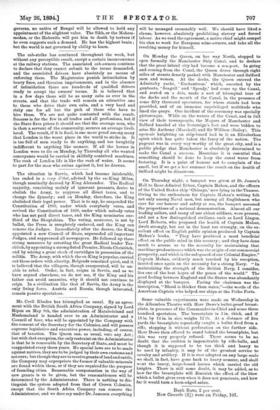The situation in Servia, which had become intolerable, has ended
in a coup d'6.tat, advised by the ex-King Milan, though nominally decreed by King Alexander. The Radical majority, consisting mainly of ignorant peasants, desire to abolish the Army, to suppress all direct taxes, and to change the dynasty ; and on Monday, therefore, the King abolished their legal power. That is to say, he suspended the Constitution of 1888, under which everybody votes, and revived the Constitution of 1869, under which nobody votes who has not paid direct taxes, and the King nominates one- third of the Skuptshina. The voting, moreover, is not by ballot, the Press is completely enslaved, and the King can remove the Judges. Immediately after the decree, the King appointed a new Council of State, superseded all important Judges, and suppressed all newspapers. He followed up these strong measures by arresting the great Radical leader Tag- -child), by appointing a strong-fisted Premier, Nicola Christitch, and by seizing a great stock of cartridges in possession of the militia. The Army, with which the ex-King is popular, carried out these orders with alacrity, Belgrade remained quiet, and it is believed that the villagers, though exasperated, will be un- able to rebel. Order, in fact, reigns in Servia, and as we have argued elsewhere, we do not see, if the King and his father can avoid assassins, why it should not continue to reign. In a civilisation like that of Servia, the Army is the only living force. Austria and Russia, though interested, remain passive spectators.


































 Previous page
Previous page